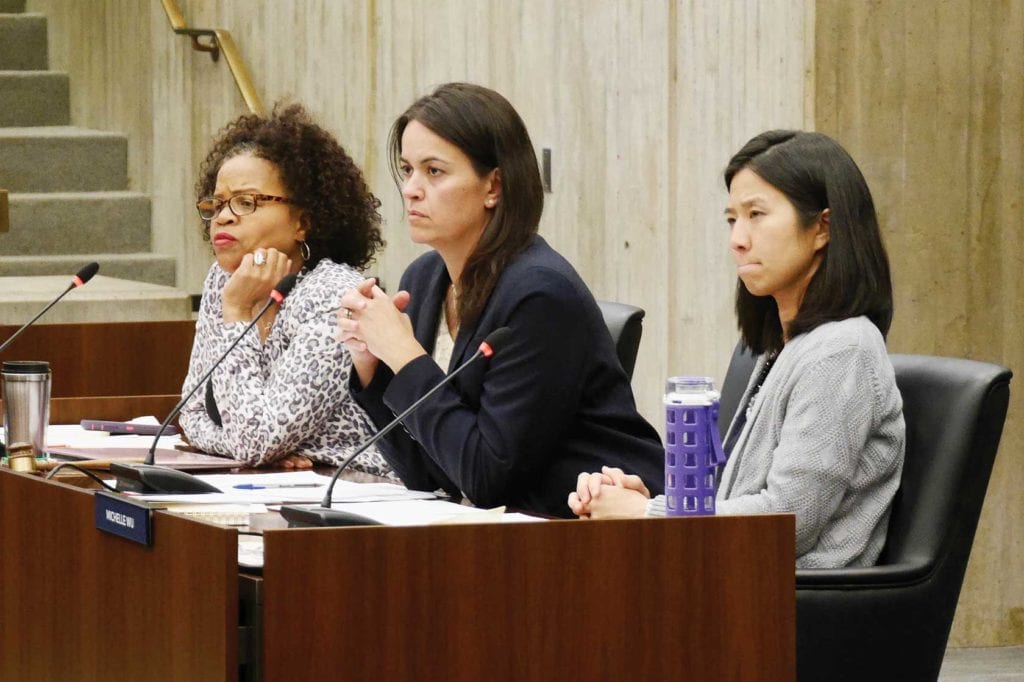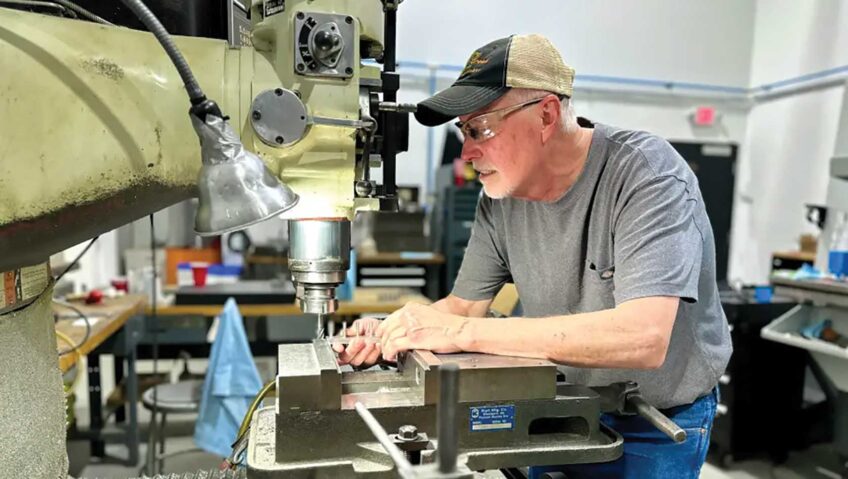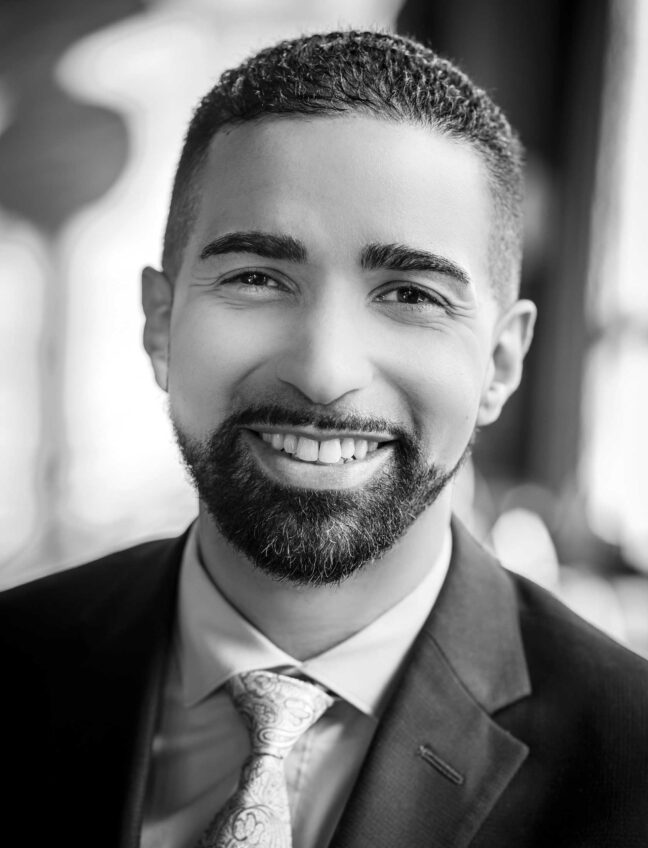
Across Massachusetts, career/vocational technical education (CVTE) high schools are in demand, to the point where many have wait lists in the hundreds. These schools employ formal admissions processes that typically take into account middle school grades, attendance, disciplinary and conduct records, guidance counselor recommendations and interviews, following guidelines from the state Department of Elementary and Secondary Education (DESE).
In contrast, Madison Park Technical Vocational High School, Boston’s only CVTE high school, is dramatically under-enrolled and employs no special admissions requirements to speak of. In fact, for years the school received students who did not consciously choose it, as the school district would “administratively assign” to Madison Park students whose parents or guardians failed to specify a school choice, or students who were not succeeding in other schools.

(l-r) Shira DeCovnick, BPS director of turnaround and transformation, Sam DePina, BPS operational superintendent, Kevin McCaskill, Madison Park Technical Vocational High School executive director were part of a panel testifying at a city council education committee hearing April 9. PHOTO: SANDRA LARSON
Now Madison Park’s executive director, Kevin McCaskill, is working to build the school’s enrollment and wants to implement an admissions policy to ensure that students attending Madison Park actively choose it and are ready for the demands and responsibilities of its integrated academic and vocational program.
City Councilors Annissa Essaibi-George, Kim Janey and Michelle Wu held an Education Committee hearing last week to discuss Madison Park’s admissions policy, funding and partnerships.
The April 9 hearing was part of a process the three councilors began a year-and-a-half ago to examine ways to strengthen Madison Park. The school has been dogged by much-publicized troubles over recent years, including rapid turnover of school leadership and an “underperforming” designation by the state in 2015, which led to the launch in 2016 of a three-year turnaround plan. After a steep decline in enrollment, numbers are inching up again, with a class of 400 freshmen due to start this fall, none of whom were administratively assigned to the school.
“We have narrowed down our focus to two main topics: the admission policy and increasing funding,” Essaibi-George, the committee chair, said as she opened the hearing.
The councilors heard testimony from a panel that included McCaskill and Boston Public Schools budget, operations, turnaround, and career and technical education directors.
McCaskill, who joined Madison Park in 2015, testified that a formal admissions policy for the school was approved by the state DESE in 2015 but that the policy has remained dormant after being “tabled” without approval by the School Committee at the time.
That policy includes four weighted-selection criteria: prior grades, counselor recommendation, discipline/conduct and attendance.
Taking into account students’ attendance is crucial for success in a vocational education program, McCaskill explained.
“If we’re training you for the world of work, you have to show up,” he said.
McCaskill recalled that one of the concerns about the policy in 2015 was a reluctance to create another sort of “exam school” that might exclude special education students. But, he said, Madison Park successfully serves a high population of special education students — typically 35 to 40 percent of the enrolled students — so that needn’t be a concern.
“I don’t think DESE would have approved it if [potential discrimination] was a problem,” he said. “If it’s good enough for every other vocational school, why not Boston?”
At the hearing, there seemed to be general agreement that implementing an admissions policy could help Madison Park provide a better learning experience. Some, however, suggested that an admissions policy could also lead to discriminatory effects.
Janey expressed support in general for ensuring that students at Madison Park are there because they want to be there, but added that a policy should be crafted with compassion.
“Our young people in middle schools are testing limits, challenging authority. They may get in trouble,” she said. “If we are going to look at things like school discipline, it’s important to recognize that every student needs a second chance, especially if they made a mistake in middle school.”
Louis Elisa, a member of the group Friends of Madison Park, testified that his organization supports and has advocated for an admissions policy, but warned that it should avoid unintended exclusion, taking into consideration external life circumstances such as homelessness, family responsibilities or lack of access to good guidance counselors.
“We can’t close people out who really want to get this education and training,” Elisa said. “Sometimes children are absent because they’re taking care of other children, or late because they’ve changed locations and they live farther away. We ask that those who are shaping and managing the progress of this admission policy reevaluate the weight given to discipline and absentee variables.”
Essaibi-George said in an interview that she supports an admissions policy.
“We don’t want any population of students feeling that Madison Park is not an available choice for them. Kids make mistakes, and we can’t hold that against them — but we need to be aware we’re bringing in kids to use heavy and sometimes dangerous equipment. You want kids in the classrooms that are aware of the commitment. It’s not about excluding, but making sure there’s a deeper understanding by families.”
Also at the hearing, advocates and CVTE experts emphasized the growing need for vocational/technical education to fill current workforce needs, and the desirability of making Madison Park a highly-regarded school for such training. Recommendations for improvement included renewing work on an admissions process; bolstering Madison Park’s reputation and enrollment through better recruiting efforts; expanding external partnerships; and increasing funding to take into account the special needs of vocational education and a high-needs student population.
A group of Madison Park teachers at the meeting did not testify, but employed fervent hand-waving at various points, showing support for ideas such as implementing an admissions policy, reexamining the weighted funding to better serve Madison Park’s high-needs population and acknowledging that CVTE schools prepare students for college and entrepreneurship as well as skilled trades.
If the 2015 admissions policy is revised, it will need to go back to DESE and to the School Committee for approval. Councilor Wu pressed BPS Operational Superintendent Sam DePina on a timeline. DePina said BPS is going to “analyze the pros and cons of the policy” but has set no timeline. Under questioning, he estimated that any revised policy would need to be approved by fall of 2019 in order to be implemented for the 2020-21 school year.






